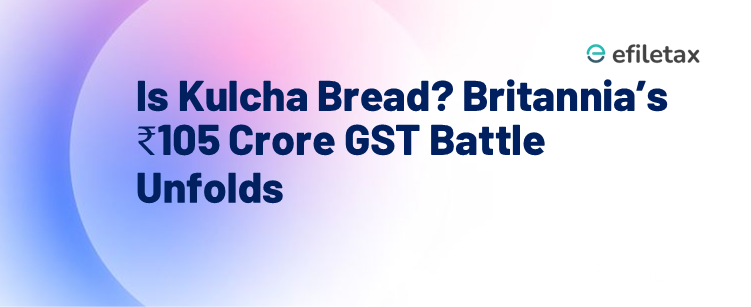
Is Kulcha Bread? The GST Exemption Debate
The GST exemption for bread has sparked heated legal debates, with Britannia Industries now required to convince the Directorate General of GST Intelligence (DGGI) that kulcha qualifies as bread and deserves GST exemption. This follows a Calcutta High Court ruling that urged Britannia to follow the legal process rather than seeking immediate judicial relief.
Understanding the Case
The dispute centers around a Show Cause Notice (SCN) issued to Britannia Industries in August 2024, demanding recovery of over ₹105 crore in GST, including penalties and interest for six financial years (FY 2017-18 to FY 2022-23). The notice alleges that Britannia wrongly classified kulcha as bread to claim an unwarranted GST exemption.
According to GST Notification No. 2/2017 (dated June 28, 2017), bread is exempt from GST unless served for consumption or classified as specialty bread like pizza bases. However, the DGGI claims kulcha falls outside the exempt category based on the Common Parlance Test, as ruled in Signature International Foods India Pvt. Ltd. (2019).
The Court’s Stance
Britannia approached the Calcutta High Court, asserting that the SCN violated the principles of natural justice and lacked jurisdiction. However, the court refrained from ruling on the merits and directed Britannia to follow statutory procedures such as responding to the SCN and pursuing appellate remedies.
This approach reinforces the importance of adhering to legal processes in tax disputes, as highlighted by Sandeep Sehgal, Partner at AKM Global. “By following prescribed procedures, businesses ensure compliance and avoid premature judicial intervention,” he stated.
Bread or Not? Legal Precedents
This case isn’t the first legal battle over bread-like products:
- Himachal Pradesh HC (2022): Ruled that rusk, as “bread-sans-moisture,” qualifies for VAT exemption.
- Meghalaya HC: Differed, holding that rusk was distinct from bread and ineligible for VAT exemption.
Such rulings underscore the complexities of tax classifications and the role of tests like the Common Parlance Test, which evaluates product perception in ordinary usage.
What This Means for Businesses
The Britannia case highlights key takeaways for businesses dealing with GST disputes:
- Know the Law: Understand applicable exemptions and classification rules.
- Follow Processes: Respond to SCNs promptly and pursue legal remedies if necessary.
- Document Evidence: Maintain detailed records to substantiate tax claims.
Conclusion
The GST exemption debate over kulcha underscores the nuanced nature of tax classifications and the importance of adhering to statutory procedures. For businesses, staying informed and compliant is critical to navigating India’s complex tax landscape.